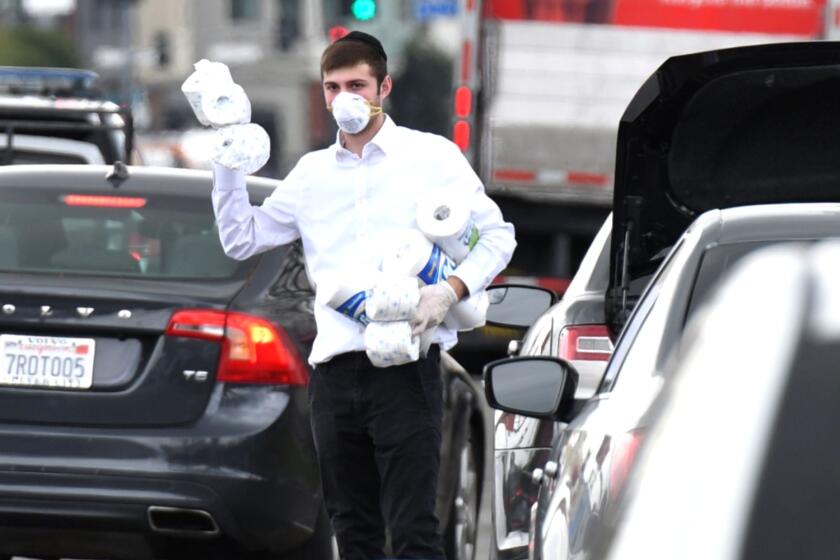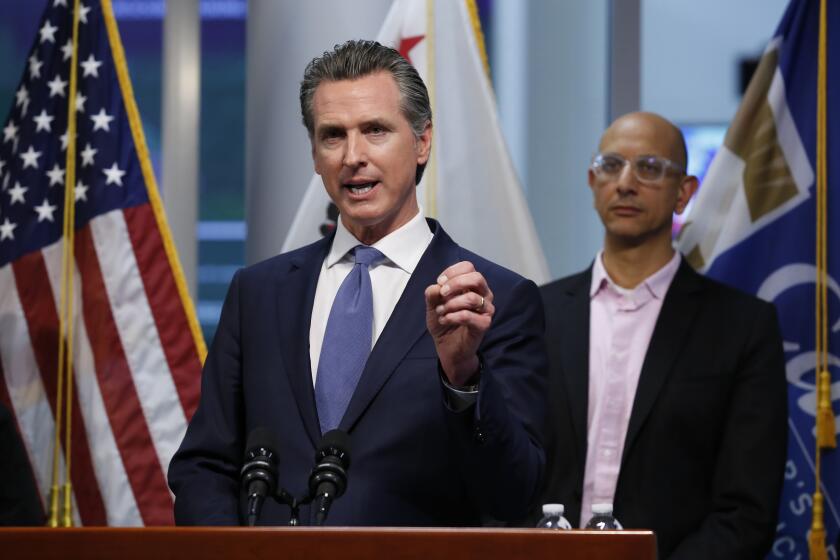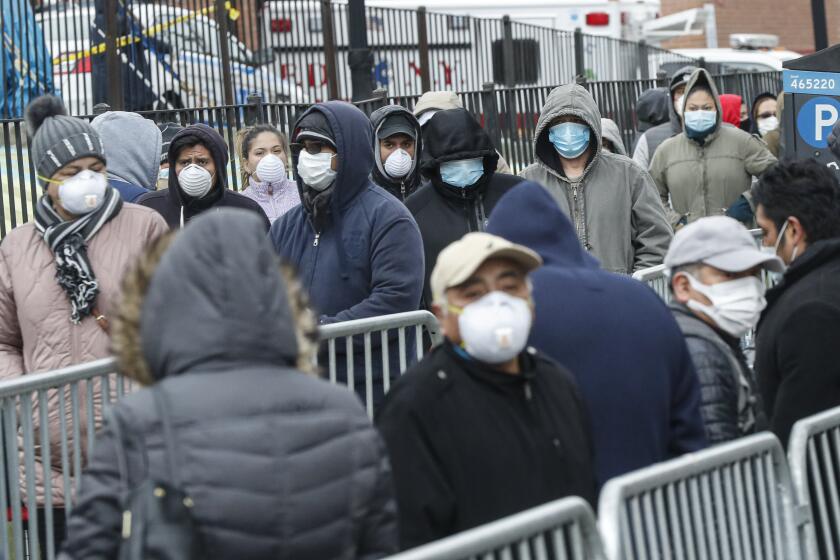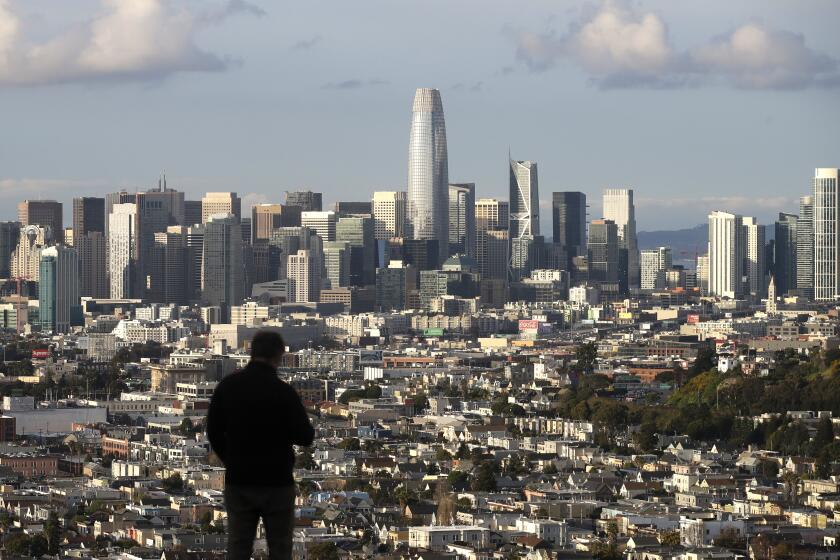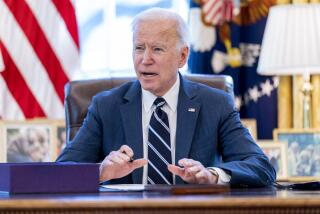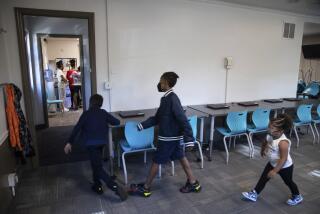Coronavirus relief package includes aid for just about everyone, including California interests

- Share via
WASHINGTON — The economic relief bill Congress is expected to approve this week would provide $1,200 direct payments to many American adults, expand eligibility for unemployment benefits to include actors and gig workers and provide funding for states.
Those provisions are among many just coming to light in a roughly $2.2-trillion package intended to help households and businesses get through the economy’s virtual shutdown as the nation combats the coronavirus outbreak.
Although supporters say the bill will help buoy Americans who have been laid off or are working reduced hours, critics have identified holes in the legislative safety net. A fourth coronavirus-related relief package already is under discussion.
Key provisions will have an effect for Californians. Among them:
Direct payments
Nearly every American adult making up to $99,000 a year, or couples with income up to $198,000, would get some payment from the government. The maximum $1,200 payment, plus $500 per child, would go to taxpayers with incomes of as much as $75,000 a year (or married couples making $150,000). The amounts would decrease for those with higher income up to the cut-off.
People who receive no income or who have income entirely from benefits programs such as Social Security are eligible.
Most Americans won’t have to do anything to get the benefit. The IRS will base the payments on a person’s 2018 tax return (or their 2019 return if filed). If the IRS has a person’s bank information on file, a direct deposit is expected to show up within weeks, according to a Senate Republican aide. Otherwise, a check or prepaid debit card will be sent.
All those presumed positive or who have tested positive for COVID-19 must self-isolate, and close contacts must self-quarantine.
Expanded unemployment benefits
The bill would extend jobless benefits by 13 weeks, on top of the typical 26-week limit, and dramatically expand who is eligible. Under the expanded program, assistance would be available to people who had the promise of a job that was postponed or canceled because of the coronavirus threat and to those whose workplace closed because of it.
That expansion was a priority of Actors’ Equity, whose members include actors and stage managers who lost their livelihood when theaters closed and productions stopped.
Broadway actor Kate Shindle, the Actors’ Equity Assn. president, estimated that one-quarter of the group’s more than 50,000 members — as well as thousands of other actors — could benefit from the provision and would not have qualified for traditional unemployment assistance. Live theaters have all but universally closed.
“The thing that’s somewhat different about the entertainment industry is that many people have an accepted offer of work and the expectation that they will be able to go and make that money,” Shindle said. “But if they haven’t started the job yet, which is the case for a lot of our folks, they would have traditionally been ineligible for unemployment.”
Gig workers — such as Uber drivers — and furloughed employees would also be eligible for unemployment benefits. Those who qualify for benefits would also get an additional $600 each week for up to four months.
Several major banks and financial institutions will delay foreclosures, provide mortgage relief to California homeowners struggling due to the coronavirus.
Funding for states and local bodies
The bill would provide $150 billion to state and local governments, including $8 billion for Native American tribes — less than what they asked for. Last week, the National Governors Assn. asked Congress for that amount just for states, while the United States Conference of Mayors sought $250 million just for cities.
The plan also includes funding for local transit systems that have lost their riders and more than $30 billion for grants to public school systems and universities — all of which will help to fill gaping holes in states’ budgets.
Yet some say it is not nearly enough.
New York authorities took action to limit a potential public health disaster in the city Wednesday, with its emergence as the nation’s biggest coronavirus hot spot.
New York Gov. Andrew Cuomo, a Democrat, slammed the deal Wednesday, saying that the $3.8 billion for his state was “a drop in the bucket as to need.” New York, which has more coronavirus cases and deaths than any other state, has already spent more than $1 billion to combat the virus. Cuomo said he expects it will spend several billion dollars more.
California Gov. Gavin Newsom said he expects the coronavirus crisis will wipe out the state’s cash reserve, which had been projected to total $21 billion by summer. Yet he was more positive about the bill.
He estimated the state would receive more than $10 billion in a block grant program, $5.5 billion directly to California and the rest to cities and counties.
“I certainly have strong points of view that there will need to be more in the future,” Newsom said at an afternoon news conference in Sacramento. “But let me just acknowledge good work. And let me just acknowledge progress, and that progress is manifest in the state of California.
Still, Newsom said more federal assistance could be needed in just a matter of weeks because of the rapid spread of the coronavirus in California and the rest of the United States, not only for the states but also for small businesses and nonprofits.
San Francisco Mayor London Breed and other leaders said Wednesday that the city could face a pandemic crisis similar to that of New York City because of medical equipment shortages.
Governors across the country are bracing for a recession that will do unknowable amounts of damage to state budgets; most economists say the nation already is in recession. And unlike the federal government, states can’t print their own money and must balance their budgets.
“Cities and states are both getting an extremely raw deal,” said Jeff Hauser of the Center for Economic and Policy Research in Washington. “We’re going to see states and localities gasping for air, having to pay their public health workers and first responders overtime. It’s just wildly insufficient.”
Hauser and other experts said the amount of money being offered to states isn’t enough to prevent cuts to essential government services and, ultimately, layoffs of government employees. For that, they are pinning their hopes on future stimulus measures.
Times staff writer Phil Willon in Sacramento contributed to this report.
More to Read
Get the L.A. Times Politics newsletter
Deeply reported insights into legislation, politics and policy from Sacramento, Washington and beyond. In your inbox twice per week.
You may occasionally receive promotional content from the Los Angeles Times.
